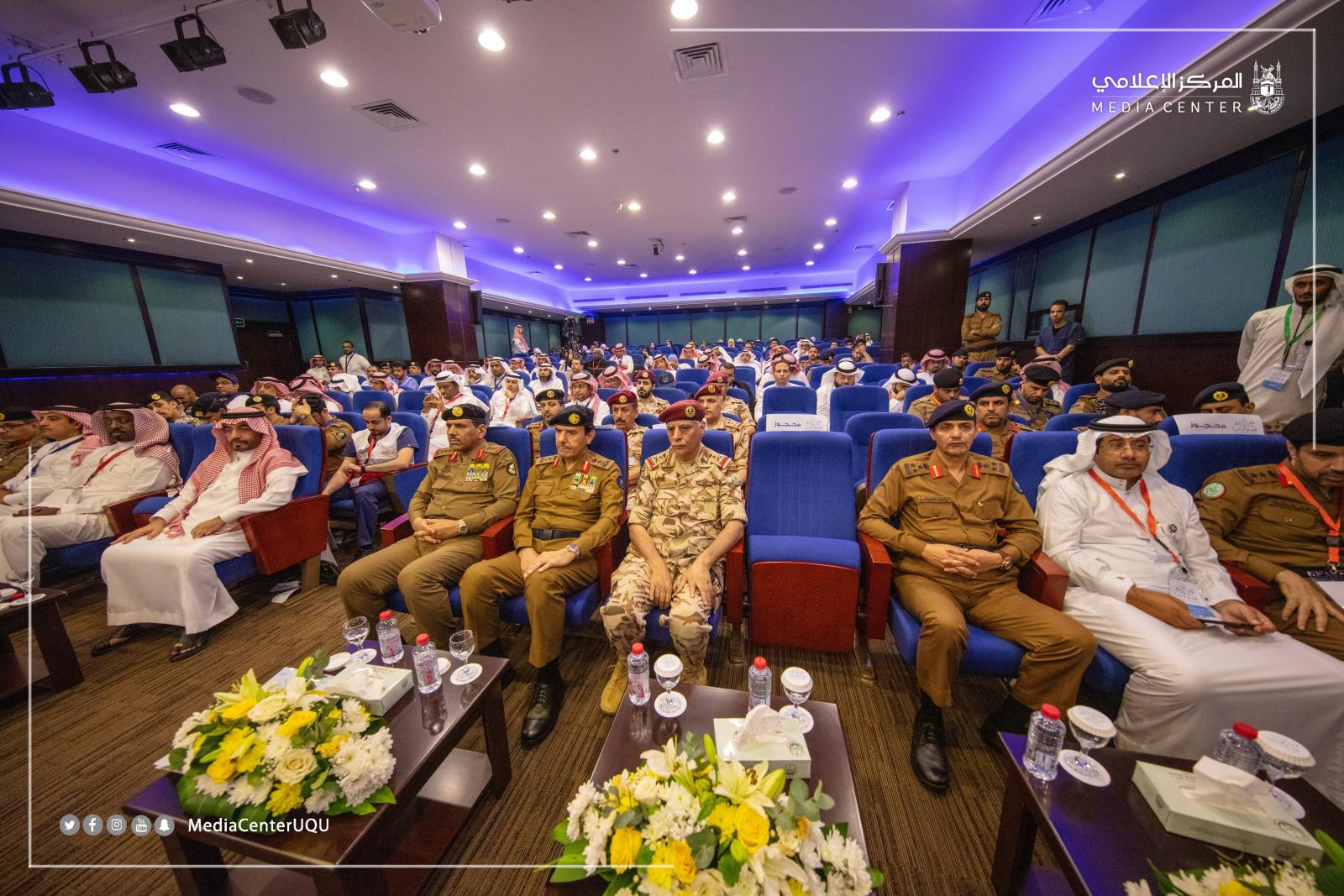
The scientific sessions of the symposium entitled, "The Use of Advanced Technologies in Hajj-Related Work (Smart Hajj)", started with the inauguration by His Royal Highness Prince Abdulaziz bin Saud bin Naif bin Abdulaziz Al Saud, the Minister of Interior and Chairman of the Higher Hajj Committee. The event was organized by the General Administration of Medical Services in the Ministry of Interior in cooperation with Umm Al-Qura University, the Public Security Department and the Saudi Health Council, and was held in the headquarters of the Security Forces Hospital in Makkah Al-Mukarramah. A total of 15 scientific papers were discussed at the inauguration in the presence of His Excellency the Director of Public Security, Colonel General, Khalid bin Qarar Al-Harbi.
The first scientific session was held under the title: "Smart Applications in the Health Field in Hajj", and was chaired by Dr. Muhammad Al-Nafi`i. During this scientific session, a member of the academic staff at the College of Computer and Information Systems in Umm Al-Qura University, Dr. Tahani Al-Subait, reviewed the topic entitled, "Artificial Intelligence and its Development and Fields that Serve the Hajj System". On the other hand, the scientific paper of Dr. Abdullah Murad, a member of the academic staff at the same college, tackled, "The Impact of Smart Applications on the Medical Emergency Services in Hajj".
This first session included a discussion of the papers submitted by Engineer Hesham Hamami, an expert in the field of technology, about "The Role of Wearable Smart Devices in the Improvement of Healthcare". Moreover, it included the scientific paper presented by the General Director of the Saudi Patient Safety Center, Dr. Abdul-Ilah Al-Hawsawi, who tackled the facilitation of the mission of healthcare providers with the Default Patient Safety Assistant. Dr. Khalid Al-Zahrani also presented his scientific paper about utilization of robots in surgical operations.
The Vice Dean of the Custodian of the Two Holy Mosques Institute for Hajj and Umrah Research (for the affairs of the research projects), Dr. Mazin Al-Shamrani, chaired the second scientific session held under the title: "Using Artificial Intelligence in the Security Field in Hajj", in which the Director of the Development of Smart Systems and Applications in the Public Security, Major Sulaiman Al-Shahri, talked about the utilization of artificial intelligence and smart applications in improving security services for the guests of Al-Rahman (Allah). The Vice Dean of the Deanship of Information Technology for E-Transactions in Umm Al-Qura University, Dr. Atef Al-Hejaili, tackled the topic of the development of digital security surveillance solutions using artificial intelligence.
In addition, the Director of the Unified Security Operations Center in Makkah Al-Mukarramah, Colonel Muhammad Al-Qarni, talked in the second session about the utilization of modern techniques in serving the pilgrims, while the Commander of Tasks and Rapid Intervention in the Special Forces of Road Security, Liutenant Colonel Muhammad Al-Qarni, tackled the utilization of artificial intelligence in security control, the application of the system, and the needs of the infrastructure.
After that, an open dialogue session was held with discussions from the General Director of the General Directorate of Passports, Major General Sulaiman Al-Yahia, the Deputy of the Ministry of Health for E-Health and Digital Transformation, Dr. Ahmed Belkhir, the supervisor of the activities and management of the National Information Center in the Presidency of State Security, Dr. Tariq Al-Shaddi, the Dean of the Custodian of the Two Holy Mosques Institute for Hajj and Umrah Research, Dr. Basim Qadi, and the General Supervisor of the Administration of Planning and Development in the Ministry of Hajj and Umrah, Dr. Amr Al-Maddah.
In this session, they tackled the "Makkah Road" Initiative, and how to use advanced techniques to achieve the targets of the program serving the guests of Al-Rahman within the Saudi Vision 2030. The session also tackled ways of benefiting from the huge amount of data, utilization of it for planning and taking appropriate future decisions, the utilization of technological development in the field of health and Hajj security, and the development of crowd management and grouping using artificial intelligence.
The third session, presided by Dr. Mansour Al-Ghamdi, tackled the technique of using artificial intelligence in the field of health in Hajj. During the session, Dr. Basim Filemban, the Head of the local committee supervising the training program of the diagnostic radiology in the western region, reviewed the subject of obtaining accurate diagnoses by reading radiographs without human intervention in Hajj, to prevent the transfer of diseases.
Regarding the advanced techniques within the smart cities system, Dr. Mazin Al-Shamrani, the Vice Dean of Research Projects in the Custodian of the Two Holy Mosques Institute for Hajj and Umrah Research in Umm Al-Qura University, talked about the impact of using those techniques in improving the services provided to the guests of Al-Rahman. Meanwhile, Dr. Emad Filemban, the Associate Professor at the College of Computer and Information Systems in Umm Al-Qura University, discussed the usage of big data in planning and taking decisions.
During this session, the senior pharmacist, Abdul-Muhsin Marghalani, offered solutions for dispensing medications during the season of Hajj using artificial intelligence, manifested in dispensing the medications to those who requested treatment through mobile devices in specific sites. This will reduce the number of visits to emergency departments, and accelerate the intake of medications.
Engineer Nour Al-Othaim presented an outline about the National Health Laboratory for the Emerging Technologies, which aims at empowering and supporting all the public and private institutions in the health sector, and providing an advanced and brilliant level of health services depending on the young Saudi calibers.
The General Director of the General Administration of Communications and Information Technology in the Saudi Red Crescent Authority, Dr. Abdul-Ilah Al-Taweel, talked about digital creativity in the ambulance services, and reviewed the experience of the Saudi Red Crescent Authority in using advanced electronic systems and applications. The aim is to improve the quality of ambulance services, which ensures a reduction in the response time.